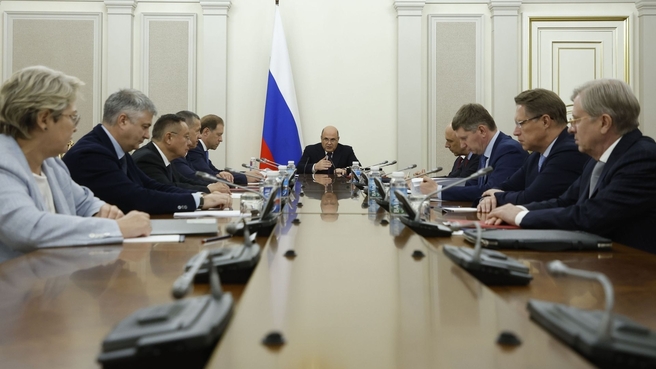Agenda: performance report for the programme to move people out of substandard housing, grants for world-class research and education centres, and a pilot project to upgrade vocational training.
Mikhail Mishustin’s opening remarks:
Good morning, colleagues.
Russia marked Construction Worker’s Day yesterday. Once again, I would like to convey my greetings to all the professionals working in this essential sector of the national economy. It has demonstrated outstanding results over the past years and made a meaningful contribution to national economic development. It is thanks to the hard work by engineers, designers, construction workers and many other professionals that new comfortable housing is built across all Russian regions, along with safe roads and the corresponding social, transport, and utilities infrastructure.
The President chaired a major meeting on developing the construction industry in the run-up to this holiday, and praised this sector for its effective performance in the key areas. The President paid special attention to the effort to resolve the substandard housing problem and issued an instruction to carry on with these efforts in order to attain all the objectives in this regard.
The Government has been proactive in carrying out the programme to help people move out of housing which has been designated as substandard before 1 January 2017. Many regions have been advancing ahead of schedule, and 14 of them have already completed the programme. In the first six months of 2023, over 50,000 people moved from substandard housing, up 22 percent year-over-year.
To keep this momentum going, today we will reallocate over 12.5 billion roubles which have become available to us. This will enable another 24 Russian regions to complete their programmes to provide new housing already in 2023, ahead of schedule. By the end of next year, all regions will embark on a new programme initiated by the President. It targets housing designated as substandard after 1 January 2017. It is essential that all these undertakings are up to standard and fully meet the deadlines, while all the funds are spent in the most effective way.
Let me say a few words about developing education. The President initiated the Decade of Science and Technology, and the Government pays a lot of attention to these matters.
We decided on the amount of funding to be received by 15 world-class research and educational centres from the federal budget as grants. These innovative platforms bring together higher education institutions, research institutions, and the real sector of the economy in 36 regions of Russia. All these stakeholders work closely together on high-potential research and development projects which are essential for Russia’s technological development, launching new manufacturing facilities and introducing cutting-edge solutions.
A total of over 1.8 trillion roubles has been earmarked for these centres with grants ranging from 60 million to 157 million roubles. They can use these funds to buy the latest equipment, devices and technology for their laboratories and carry out projects.
Russian science has a huge potential. We will continue helping it to realise this potential in full so that Russian scientists and inventors can achieve new successes.
Another matter related to higher education is that the Government has drawn up a pilot project as part of the effort to implement the tasks on upgrading the higher education system as outlined by the President in his Address to the Federal Assembly. The project is aimed at raising the level of higher education by establishing a relationship between the existing university education system and the new solutions that will be tested at the start of the next academic year and thereafter.
This approach to training will be applied in more than 100 professional areas, including land management, engineering, transport, photonics, instrument-making, information and chemical technologies, regional and industry-specific economics, and a number of others.
Universities will be able to develop educational standards in each of these areas. Specialists with degrees in these professions are in high demand on the labour market.
We have also defined efficiency criteria for the education process involved in implementing this project. The key parameters include the quality of enrolment in higher education institutions, a characteristic that takes into account the length of employment, prizes won at professional competitions, and a number of other important indicators, as well as employers’ involvement, including in terms of practical training. We repeatedly observed this while visiting various educational institutions and colleges where employers set their sights on eligible graduates and occasionally even on students.
Scheduled for the next three academic years, the pilot projects will be implemented at six universities from Kaliningrad to Tomsk.
As noted by the President, higher education needs changes that would take into account the new requirements placed on specialists. It has to synthesise the best of the Soviet educational system and the best practices of the last few decades.
It is this approach that guided us in the process of creating conditions for the implementation of this pilot project. I am confident that it will form an important part of the comprehensive effort to modernise our higher education institutions.









